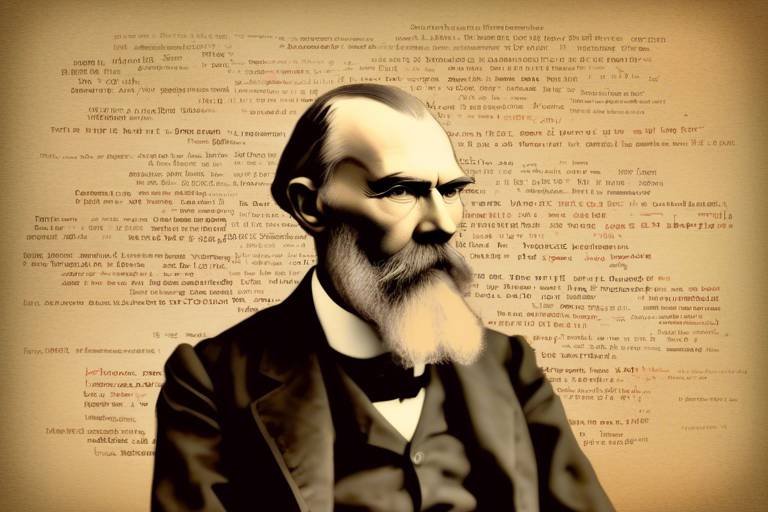Living the 'Good Life' According to Epicurus
Have you ever pondered what it truly means to live the 'good life'? For many, this quest can feel like chasing a mirage, always just out of reach. However, the ancient Greek philosopher Epicurus offers a refreshing perspective that can guide us on this journey. Epicurus believed that happiness is not found in the pursuit of wealth or fame, but rather in the embrace of simple pleasures, the cultivation of meaningful relationships, and the pursuit of wisdom. His teachings remind us that the essence of a fulfilling life is not about accumulating possessions but about savoring the moments that bring us joy and contentment.
Imagine for a moment your ideal day. Perhaps it starts with a delicious breakfast, followed by a leisurely walk in the park, and ends with laughter shared among friends. This vision aligns closely with Epicurean philosophy, which emphasizes the importance of pleasure as a vital component of happiness. But what does this really mean? Epicurus taught that not all pleasures are created equal. Some are fleeting and superficial, while others can lead to lasting fulfillment. By understanding the different types of pleasures and prioritizing those that nourish our souls, we can craft a life that feels genuinely rewarding.
As we delve deeper into Epicurus's philosophy, we discover that the good life is not just about indulging in physical pleasures, but also about nurturing our mental well-being. Epicurus categorized pleasures into two main types: physical and mental. Physical pleasures often include the basic needs that we all crave, such as food, comfort, and rest. However, it's crucial to approach these indulgences with moderation. Overindulgence can lead to discomfort and dissatisfaction, whereas a balanced approach allows us to truly appreciate the joys of life without falling into excess.
On the other hand, mental pleasures encompass the richness of human connection and the joys of contemplation. Epicurus placed a high value on friendship, asserting that it is one of the greatest sources of joy we can experience. Engaging in deep conversations, sharing laughter, and supporting one another through life's challenges are all aspects of friendship that enhance our experience of the good life. In a world that often prioritizes individual success, Epicurus's teachings remind us that our relationships are essential to our happiness.
Furthermore, the pursuit of wisdom is another cornerstone of Epicurean thought. By seeking knowledge and understanding, we empower ourselves to navigate the complexities of life more effectively. Epicurus believed that wisdom helps us manage our fears and desires, which are often the root causes of our unhappiness. By learning to recognize and address these emotions, we can achieve a more balanced and fulfilling existence.
Incorporating mindfulness into our daily lives is also a key aspect of living the good life according to Epicurus. By focusing on the present moment, we can cultivate a deeper appreciation for the experiences we encounter. This practice encourages us to savor our meals, relish our friendships, and fully engage with the world around us. Living in the moment allows us to connect more deeply with ourselves and others, ultimately leading to a richer, more satisfying life.
In summary, Epicurus's philosophy provides a roadmap for achieving happiness through the embrace of simple pleasures, the nurturing of meaningful relationships, and the pursuit of wisdom. By understanding and applying these principles, we can create a life that feels abundant and fulfilling. So, the next time you find yourself chasing after the elusive 'good life', remember to pause, reflect, and savor the moments that truly matter.
- What is the main idea of Epicurean philosophy?
Epicurean philosophy emphasizes that true happiness comes from simple pleasures, meaningful relationships, and the pursuit of wisdom. - How does Epicurus define pleasure?
Epicurus categorizes pleasures into physical and mental, advocating for moderation in physical indulgences and the nurturing of mental joys like friendship. - Why is friendship important in Epicurean thought?
Friendship is considered one of the greatest sources of joy, enhancing our overall experience of life and providing support and companionship. - What role does wisdom play in achieving happiness?
Wisdom helps us manage our fears and desires, allowing us to navigate life’s challenges more effectively and achieve a balanced existence. - How can I incorporate Epicurean principles into my life?
Focus on savoring simple pleasures, nurturing your relationships, and pursuing knowledge while practicing mindfulness in your daily activities.

The Philosophy of Epicurus
Epicurus, a philosopher from ancient Greece, had a unique perspective on what it means to live the 'good life'. His teachings remind us that happiness is not merely a byproduct of wealth or status, but rather a state of being that arises from understanding and embracing the simple pleasures of life. He argued that the pursuit of pleasure is essential, but it’s crucial to distinguish between fleeting joys and those that provide lasting fulfillment. This distinction is what sets Epicurean philosophy apart from more hedonistic views. It’s about finding a balance, appreciating the little things, and cultivating a life rich in meaning.
At the core of Epicurus's philosophy is the idea that true pleasure comes from the absence of pain and fear. He believed that by understanding our desires and fears, we could navigate life more effectively and find genuine happiness. This approach is akin to tending a garden; if we nourish it with the right elements and remove the weeds of unnecessary desires and fears, we can cultivate a vibrant and fulfilling life. Epicurus emphasized that not all pleasures are equal, and some can lead to more pain than joy if pursued without thought.
Moreover, Epicurus taught that the pursuit of wisdom is essential for achieving a good life. Knowledge helps us understand what truly brings us joy and how to avoid the pitfalls of excessive desires. He encouraged people to seek understanding and clarity, which can lead to a more profound sense of satisfaction. This wisdom isn’t just about intellectual pursuits; it’s about applying what we learn in our everyday lives. By embracing this philosophy, we can create a life filled with meaningful experiences and relationships.
In summary, the philosophy of Epicurus is a call to reflect on our lives and prioritize what truly matters. By focusing on simple pleasures, nurturing our friendships, and seeking wisdom, we can achieve a state of happiness that is both deep and lasting. So, the next time you find yourself chasing after something fleeting, remember Epicurus's teachings and consider whether it will bring you true joy or merely a momentary thrill.

The Role of Pleasure
Pleasure is not just a fleeting moment of joy; it is the cornerstone of Epicurean philosophy. Epicurus taught that the pursuit of pleasure is essential for a fulfilling life, but he emphasized that not all pleasures are created equal. Instead of chasing after every shiny object or momentary thrill, he encouraged us to seek out those pleasures that genuinely enrich our lives and contribute to our long-term happiness. This distinction is crucial because it allows us to focus on what truly matters, steering clear of distractions that may lead us astray.
In Epicurus's view, pleasure can be categorized into two main types: physical and mental. Understanding these categories helps us prioritize our pursuits and make informed choices about how we spend our time and energy. Physical pleasures include the basic joys of life, such as savoring a delicious meal, enjoying a warm bath, or basking in the sun's rays. These experiences can bring immediate gratification, but they need to be approached with a sense of moderation. Overindulgence can lead to discomfort and detract from the joy that these simple pleasures provide.
On the other hand, mental pleasures are often deeper and more fulfilling. They encompass experiences such as friendship, love, and intellectual pursuits. Engaging in meaningful conversations, sharing laughter with friends, or diving into a good book can create lasting memories and enrich our lives in ways that physical pleasures often cannot. Epicurus believed that cultivating these mental pleasures is vital for achieving a well-rounded and satisfying existence.
To illustrate the balance between physical and mental pleasures, consider the following table:
| Type of Pleasure | Examples | Impact on Happiness |
|---|---|---|
| Physical | Food, Comfort, Nature | Immediate satisfaction, but can lead to excess if not moderated |
| Mental | Friendship, Knowledge, Creativity | Long-lasting joy and fulfillment, enriching our lives |
Epicurus's teachings remind us that pleasure should not be pursued recklessly. Instead, we should aim for a harmonious balance where both physical and mental pleasures coexist. By focusing on what truly brings us joy—whether it’s a cozy evening with friends or a quiet moment of reflection—we can create a life rich in meaning and satisfaction. So, the next time you find yourself chasing a fleeting thrill, take a moment to reflect on whether it aligns with the deeper pleasures that contribute to your overall happiness.
Ultimately, the role of pleasure in our lives is to guide us toward a more fulfilling existence. By embracing the teachings of Epicurus, we can learn to appreciate the simple joys while also nurturing our minds and relationships. This dual approach not only enhances our personal happiness but also fosters a sense of community and connection with those around us.

Types of Pleasures
When we think about pleasure, it’s easy to get caught up in the whirlwind of fleeting moments—like that first bite of a decadent dessert or the thrill of a new gadget. However, Epicurus had a more nuanced view of pleasure that goes beyond the immediate gratification of our senses. He categorized pleasures into two main types: physical and mental. Understanding these categories can significantly enhance our approach to achieving a fulfilling life.
Physical pleasures are those that engage our senses directly. They include the basic needs we all have, such as food, shelter, and comfort. Imagine sitting down to a warm meal after a long day. That initial satisfaction is a physical pleasure, but Epicurus would argue that it’s the moderation in these pleasures that leads to a richer life experience. Overindulgence can lead to discomfort and even suffering, which is the opposite of what we seek. Therefore, the key is to savor these moments without letting them consume us.
On the other hand, we have mental pleasures, which delve deeper into our emotional and intellectual satisfaction. These pleasures might include the joy of friendship, the thrill of learning something new, or the peace found in contemplation. For instance, think about the last time you shared a hearty laugh with a friend or lost yourself in a good book. These moments not only uplift our spirits but also nourish our minds. Epicurus believed that nurturing our mental well-being is just as important, if not more so, than indulging in physical pleasures.
To further illustrate these concepts, let’s break down the types of pleasures in a simple table:
| Type of Pleasure | Description | Examples |
|---|---|---|
| Physical | Direct sensory experiences that fulfill basic needs | Food, Comfort, Rest |
| Mental | Emotional and intellectual satisfaction | Friendship, Learning, Contemplation |
In conclusion, both physical and mental pleasures play vital roles in the Epicurean philosophy of happiness. By recognizing the importance of moderation in our physical indulgences and prioritizing our mental well-being, we can strive for a more balanced and satisfying life. So, the next time you indulge in a treat or share a laugh with a friend, remember that it’s not just about the moment—it’s about how these experiences contribute to our overall happiness.

Physical Pleasures
When we think about the concept of pleasure, it's easy to get caught up in the whirlwind of indulgence and excess. However, Epicurus had a different take on this notion. He believed that physical pleasures are essential, but they should be approached with a sense of moderation and mindfulness. Imagine savoring a delicious meal—not just gobbling it down, but truly appreciating each bite. This is the essence of physical pleasure that Epicurus championed. It’s about finding joy in the simple things, like the warmth of the sun on your skin or the comfort of a cozy blanket after a long day.
Epicurus categorized physical pleasures into two main types: necessary and unnecessary. Necessary pleasures are those that fulfill our basic needs and contribute to our well-being, while unnecessary pleasures can lead to overindulgence and dissatisfaction. Let’s break this down further:
| Type of Pleasure | Description |
|---|---|
| Necessary Pleasures | These include basic needs such as food, shelter, and health. They are vital for our survival and happiness. |
| Unnecessary Pleasures | These are indulgences that go beyond basic needs, like excessive luxury items or extravagant meals that can lead to discomfort. |
By focusing on necessary pleasures, we can cultivate a sense of contentment that doesn’t rely on the fleeting highs of excess. For instance, enjoying a well-cooked meal with friends can be a source of joy without tipping into gluttony. The key here is to embrace moderation. Epicurus believed that when we indulge in physical pleasures, doing so mindfully can enhance our overall experience. Think of it as a balance—too much of anything can tip the scales toward dissatisfaction.
Moreover, physical pleasures are not just about the body; they also impact our mental state. When we take care of our physical needs, we create a solid foundation for emotional well-being. For example, getting enough sleep, eating nutritious foods, and engaging in physical activity can significantly boost our mood and energy levels. It’s like tuning an instrument; when every string is in harmony, the music flows beautifully.
In a world that often glorifies excess, Epicurus reminds us that true happiness can be found in the simple, everyday experiences that nourish both body and soul. So, the next time you sit down for a meal, take a moment to appreciate the flavors, the company, and the experience as a whole. This mindful approach not only enhances our enjoyment but also aligns with Epicurus’s philosophy of seeking a balanced and fulfilling life.
In conclusion, physical pleasures, when approached with moderation and mindfulness, can lead to a richer and more satisfying life. By prioritizing necessary pleasures and being aware of the impact of our indulgences, we can cultivate a lifestyle that resonates with Epicurean ideals. After all, the good life is not about chasing after every fleeting pleasure but rather about cherishing the moments that truly matter.
- What are necessary pleasures according to Epicurus? Necessary pleasures are basic needs that contribute to our survival and happiness, such as food, shelter, and health.
- How can I practice moderation in physical pleasures? Focus on savoring experiences, appreciating the quality of what you consume rather than the quantity, and being mindful of your body's needs.
- Why is mindfulness important in enjoying physical pleasures? Mindfulness allows us to fully appreciate experiences, leading to greater satisfaction and preventing overindulgence.

Mental Pleasures
Mental pleasures are the treasures of the mind that enrich our lives far beyond the fleeting joys of physical indulgence. Epicurus emphasized that while physical pleasures, such as a delicious meal or a cozy blanket, are delightful, it is the mental pleasures that truly cultivate long-lasting happiness. These pleasures stem from our relationships, our thoughts, and our experiences. Think about it: a hearty laugh shared with a friend or the satisfaction of solving a complex problem can bring a sense of joy that a mere indulgence in food cannot match. This is where the essence of Epicurean philosophy shines—by prioritizing mental pleasures, we can achieve a deeper, more fulfilling existence.
One of the most profound sources of mental pleasure is friendship. Epicurus believed that forming strong, meaningful connections with others is crucial for a happy life. Engaging in deep conversations, sharing experiences, and simply being there for one another creates bonds that nourish our souls. These connections provide emotional support and a sense of belonging, which are vital for our well-being. When we invest time in nurturing our friendships, we are essentially investing in our happiness. The laughter, shared memories, and even the challenges we face together contribute to a rich tapestry of life that is far more satisfying than any material possession.
Another significant aspect of mental pleasure is contemplation. Taking the time to reflect on our lives, our choices, and our values can lead to profound insights and a greater understanding of ourselves and the world around us. This practice of mindfulness allows us to appreciate the present moment and recognize the beauty in our everyday experiences. Epicurus encouraged us to engage in thoughtful reflection, as it can help us identify what truly matters in our lives. By focusing on our passions and interests, we can cultivate a sense of purpose that contributes to our overall happiness.
Furthermore, the pursuit of knowledge is a vital source of mental pleasure. Learning new things, whether through reading, exploring new ideas, or engaging in stimulating discussions, can ignite our curiosity and inspire us. When we expand our horizons, we not only enrich our minds but also enhance our ability to enjoy life. Knowledge empowers us to make informed choices that align with our values and desires, leading to a more authentic and satisfying existence. In essence, the more we know, the more we can appreciate the world, and the more pleasure we can derive from our experiences.
In summary, mental pleasures are essential components of the good life as described by Epicurus. By valuing friendship, engaging in contemplation, and pursuing knowledge, we can cultivate a rich inner life that brings lasting joy and fulfillment. These mental pleasures act as the foundation upon which we build a life worth living, reminding us that true happiness often lies not in what we have, but in how we connect, reflect, and grow.
- What are mental pleasures according to Epicurus? Mental pleasures are derived from relationships, contemplation, and the pursuit of knowledge, contributing to long-lasting happiness.
- Why are friendships important for happiness? Friendships provide emotional support, a sense of belonging, and shared experiences that enhance our overall well-being.
- How can I cultivate mental pleasures in my life? You can cultivate mental pleasures by nurturing friendships, engaging in reflective practices, and pursuing knowledge through learning and exploration.
- What role does mindfulness play in mental pleasures? Mindfulness helps us appreciate the present moment, recognize the beauty in our experiences, and foster a deeper connection with ourselves and others.

The Importance of Friendship
Epicurus, the ancient Greek philosopher, held friendship in the highest regard, believing it to be one of the greatest sources of joy in life. Imagine your life as a canvas; the vibrant colors that make it come alive are the relationships you cultivate. Without friends, that canvas would be dull and lifeless. In Epicurean philosophy, friendships are not just a luxury; they are essential for achieving the 'good life.' They enrich our experiences, provide emotional support, and help us navigate the complexities of existence.
One of the key reasons friendship is so vital is its role in enhancing our happiness. When we share our joys and sorrows with friends, we amplify the good times and lighten the burden of the bad ones. It's like having a personal cheerleader in your corner, someone who celebrates your victories and comforts you during your defeats. Epicurus believed that true friends are those who contribute to our well-being and happiness, making life more enjoyable and fulfilling.
Moreover, friendships foster a sense of belonging and community. In today's fast-paced world, it's easy to feel isolated, but having close friends can provide that much-needed connection. They remind us that we are not alone in our struggles and that we have a support system ready to lift us up. Epicurus emphasized that the quality of our friendships matters more than the quantity. A few deep, meaningful relationships can bring more joy than a multitude of superficial connections.
To illustrate the transformative power of friendship, consider the following table that outlines the benefits of nurturing these bonds:
| Benefit | Description |
|---|---|
| Emotional Support | Friends provide comfort during tough times, helping us cope with stress and anxiety. |
| Increased Happiness | Sharing experiences with friends amplifies joy and creates lasting memories. |
| Personal Growth | Friends challenge us to grow, learn, and become better versions of ourselves. |
| Health Benefits | Strong social ties have been linked to improved physical health and longevity. |
In conclusion, the importance of friendship in Epicurean philosophy cannot be overstated. It serves as a foundation for a happy and fulfilling life. So, take a moment to appreciate your friends; reach out, share a laugh, or lend a listening ear. After all, it's these connections that truly make life worth living.
- Why is friendship important according to Epicurus? Friendship is essential for happiness and well-being, providing emotional support and enhancing life experiences.
- How can I cultivate deeper friendships? Focus on quality over quantity, invest time in your relationships, and communicate openly with your friends.
- What role does friendship play in achieving a fulfilling life? Friendships contribute to joy, support, and personal growth, making them vital for a fulfilling existence.

The Pursuit of Wisdom
When we think about the concept of wisdom, it often feels like a lofty goal, something reserved for philosophers and sages. However, Epicurus placed a significant emphasis on wisdom as a fundamental component of living a fulfilling life. He believed that wisdom is not just about accumulating knowledge but about understanding how to apply that knowledge to enhance our daily existence. In a world filled with distractions and superficial information, the pursuit of wisdom can sometimes feel like searching for a needle in a haystack. But fear not! The journey towards wisdom is not only achievable; it can also be incredibly rewarding.
At the heart of Epicurean philosophy is the idea that wisdom helps us navigate life's complexities. It empowers us to differentiate between what truly matters and what is merely a fleeting desire. Epicurus taught that by understanding the nature of our desires and fears, we can make choices that lead to a more satisfying and peaceful life. This understanding allows us to focus on the pleasures that bring lasting joy rather than being sidetracked by temporary gratifications.
So, how do we pursue wisdom in our everyday lives? Here are some essential steps:
- Reflect on Your Experiences: Take time to think about your past decisions and their outcomes. What have you learned? Reflection can illuminate patterns in your life.
- Seek Knowledge: Read books, attend lectures, or engage in discussions that challenge your thinking. Knowledge is the foundation upon which wisdom is built.
- Practice Mindfulness: Being present in the moment allows you to absorb experiences fully. Mindfulness can lead to deeper insights and a better understanding of yourself and your surroundings.
- Engage with Others: Conversations with friends and mentors can provide new perspectives and insights that enhance your understanding of various subjects.
Wisdom also involves recognizing the limits of our knowledge. As we grow and learn, we must remain open to new ideas and willing to adjust our beliefs. This flexibility is crucial in a world that is constantly changing. Epicurus believed that wisdom is not static; it evolves as we encounter new experiences and challenges. By embracing a mindset of continuous learning, we can cultivate a deeper understanding of ourselves and the world around us.
Moreover, Epicurus emphasized the importance of understanding our fears and desires as a pathway to wisdom. He taught that many of our anxieties stem from misconceptions about what will bring us happiness. For instance, the fear of death is often rooted in the belief that it is something to be dreaded. However, Epicurus argued that understanding the nature of life and death can free us from this fear, allowing us to live more fully in the present. By confronting our fears and desires head-on, we can make more informed choices that align with our values and lead to true happiness.
In summary, the pursuit of wisdom is a vital aspect of living the good life according to Epicurus. It involves a commitment to learning, reflection, and self-awareness. By cultivating wisdom, we can navigate the complexities of life with greater ease, making choices that enhance our well-being and lead us toward lasting fulfillment. Remember, the journey to wisdom is ongoing, and every step you take towards understanding is a step towards a richer, more meaningful life.
1. What is the role of wisdom in Epicurean philosophy?
Wisdom is considered essential in Epicurean philosophy as it helps individuals make informed choices, understand their desires and fears, and ultimately leads to a more fulfilling life.
2. How can I start pursuing wisdom in my daily life?
You can start by reflecting on your experiences, seeking knowledge through reading and discussions, practicing mindfulness, and engaging with others to gain new perspectives.
3. Why is understanding fear and desire important?
Understanding fear and desire is crucial because it allows individuals to confront anxieties and misconceptions, leading to more informed decisions that align with their true values and happiness.

Understanding Fear and Desire
Epicurus had a unique take on fear and desire, two emotions that can significantly impact our happiness. He believed that understanding and managing these feelings was essential for leading a fulfilling life. Imagine fear as a shadow lurking behind you, always ready to pounce, while desire is like a bright light, drawing you towards what you think will make you happy. But what if I told you that both can be tamed? Epicurus taught that by confronting our fears and desires head-on, we can gain control over them, rather than letting them control us.
To start, let’s consider fear. Many of us are haunted by fears, whether it's the fear of failure, rejection, or even death. Epicurus argued that most of our fears are rooted in misconceptions. For instance, the fear of death often stems from the belief that it is something to be dreaded. However, he believed that death is simply the cessation of sensation—once we’re gone, we no longer experience anything, so why should we fear it? By reframing our understanding of death, we can alleviate a significant source of anxiety and live more freely.
On the flip side, desires can be equally tricky. They often lead us on a wild goose chase, convincing us that happiness lies in material possessions or status. Epicurus encouraged us to distinguish between natural desires—those that are necessary for our well-being, like food and shelter—and vain desires, which are often insatiable and lead to discontent. By focusing on fulfilling our natural desires, we can cultivate a sense of satisfaction and peace.
Here’s a simple table to illustrate the difference between these two types of desires:
| Type of Desire | Description | Impact on Happiness |
|---|---|---|
| Natural Desires | Essential needs like food, shelter, and companionship | Promotes contentment and well-being |
| Vain Desires | Excessive wants like luxury items and social status | Leads to dissatisfaction and anxiety |
By recognizing these distinctions, we can better navigate our emotional landscape. Epicurus believed that true happiness comes from managing our fears and desires wisely. Instead of letting them dictate our lives, we can take charge by practicing mindfulness and self-reflection. Ask yourself: What do I truly need, and what is simply a fleeting want? This kind of introspection can help you prioritize what genuinely contributes to your happiness.
Moreover, Epicurus emphasized the importance of community in this journey. Sharing your fears and desires with trusted friends can provide support and perspective, making it easier to confront them. After all, we’re social beings, and the connections we form can help us tackle even the most daunting challenges. So, the next time you feel overwhelmed by fear or desire, consider reaching out to someone who can help you process those feelings. Together, you can find clarity and move towards a more fulfilling life.
In essence, understanding fear and desire is about achieving balance. By confronting our fears and recognizing the nature of our desires, we can pave the way for a more serene and joyful existence, one that aligns closely with Epicurean philosophy. So, take a deep breath, embrace the journey, and remember that happiness is not just a destination but a way of living.
- What is the main philosophy of Epicurus? Epicurus taught that the key to happiness is through simple pleasures, meaningful relationships, and the pursuit of wisdom.
- How can I manage my fears according to Epicurus? By reframing your understanding of fear, particularly the fear of death, and confronting it directly.
- What types of desires should I focus on? Focus on natural desires that promote well-being, while being cautious of vain desires that lead to dissatisfaction.
- How can friendships enhance my happiness? Meaningful connections provide support and perspective, helping you navigate fears and desires more effectively.

Living in the Moment
Living in the moment is a concept that resonates deeply with the teachings of Epicurus. It’s about embracing the here and now, savoring each experience, and finding joy in the present rather than getting lost in regrets about the past or anxieties about the future. Imagine taking a leisurely walk in a beautiful park, where the sun is shining, birds are chirping, and a gentle breeze is caressing your skin. Instead of worrying about tomorrow's tasks or dwelling on yesterday's mistakes, you focus on the vibrant colors of the flowers and the laughter of children playing nearby. This is what it means to truly live in the moment.
Epicurus believed that by immersing ourselves in the present, we can unlock a deeper sense of happiness. He argued that many of our anxieties stem from our desires for things we may never attain or from fears of what might happen. By practicing mindfulness, we can learn to appreciate the simple pleasures that surround us. Mindfulness is not just a buzzword; it’s a powerful tool for cultivating a richer and more fulfilling life.
To live in the moment, consider these practical steps:
- Practice Mindfulness: Take a few minutes each day to focus on your breath, observe your thoughts, and center yourself in the present.
- Engage Fully: When you’re with friends or family, put away distractions like your phone. Listen actively and engage in meaningful conversations.
- Savor Experiences: Whether it’s enjoying a delicious meal or watching a sunset, take the time to appreciate the moment fully. Notice the flavors, colors, and feelings involved.
By incorporating these practices into our daily lives, we can foster a sense of appreciation for what we have right now. Epicurus taught that happiness is not found in the pursuit of fleeting pleasures but rather in the appreciation of life’s simple joys. This approach allows us to cultivate a deeper sense of satisfaction and contentment.
Moreover, living in the moment encourages us to let go of the burdens of our past and the worries of our future. It’s like carrying a heavy backpack filled with stones; when we focus on the present, we can set down that weight and move freely. This liberation can lead to greater happiness and fulfillment, aligning perfectly with Epicurus's philosophy.
In essence, living in the moment is about embracing life as it unfolds. It’s about finding joy in the mundane and recognizing that every moment is an opportunity for happiness. So, take a deep breath, look around, and appreciate the beauty of now. After all, the good life is not a distant destination; it’s right here, waiting for you to enjoy.
1. What does it mean to live in the moment?
Living in the moment means fully engaging with the present experience, appreciating what you have now, and letting go of past regrets and future anxieties.
2. How can I practice mindfulness?
You can practice mindfulness through techniques like meditation, deep breathing, and focusing on your senses to enhance your awareness of the present.
3. Why is living in the moment important for happiness?
Living in the moment allows you to appreciate life's simple pleasures, reducing anxiety and enhancing your overall sense of well-being.
4. Can mindfulness improve my relationships?
Yes! By being present and engaged, you can foster deeper connections and more meaningful interactions with others.
Frequently Asked Questions
- What is the main principle of Epicurean philosophy?
The core principle of Epicurean philosophy is that the 'good life' is achieved through the pursuit of pleasure, but not just any pleasure. Epicurus emphasized the importance of understanding which pleasures lead to lasting happiness and fulfillment, rather than fleeting joys.
- How does Epicurus categorize pleasure?
Epicurus categorized pleasures into two main types: physical and mental. Physical pleasures include basic needs like food and comfort, while mental pleasures encompass deeper experiences such as friendship and contemplation. Recognizing these categories helps individuals prioritize what truly brings satisfaction in life.
- Why is friendship important in Epicurean thought?
Friendship is considered one of the greatest sources of joy in Epicurean philosophy. Epicurus believed that meaningful connections with others enhance our overall experience of life, providing emotional support and enriching our journey toward happiness.
- What role does wisdom play in achieving happiness?
Wisdom is crucial in Epicurean thought as it guides individuals in managing their fears and desires. By pursuing knowledge and understanding, we can make informed choices that lead to a more fulfilling existence and ultimately, greater happiness.
- How can I manage my fears and desires according to Epicurus?
Epicurus taught that achieving a balance between our fears and desires is essential for happiness. Strategies include reflecting on what truly matters, practicing mindfulness, and recognizing that many fears are unfounded. By doing so, we can cultivate a more peaceful and contented life.
- What does it mean to live in the moment?
Living in the moment means being fully present and engaged in our current experiences. Epicurus emphasized that mindfulness can lead to a more enjoyable and fulfilling life. By focusing on the here and now, we can appreciate the simple pleasures that life offers.



















